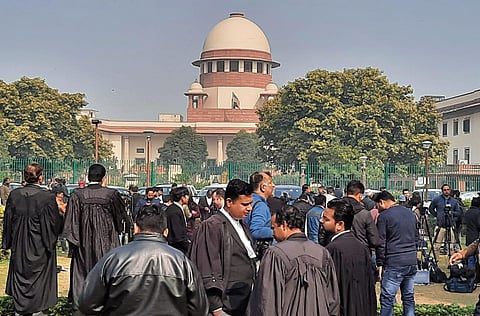

NEW DELHI: The Supreme Court on Wednesday gave the Centre four weeks to respond to pleas challenging the validity of the Citizenship Amendment Act (CAA) and said it will set up a five-judge Constitution bench to hear the petitions.
While making it clear that it will not grant any stay on the CAA without hearing the Centre, a bench headed by Chief Justice S A Bobde restrained all high courts from hearing pleas on CAA till it decides on the petitions.
The court said that it would hear Assam-related matters separately because it has an Accord and the cut-off date for NRC is different, so that is why the petitions were different from other cases.
CJI Bobde also asked court officials to bunch up Assam cases separately.
During the hearing, the bench also said that it would hear smaller matters in-chamber while the other matters can be heard by the constitution bench for which the schedule will be decided later.
"The petitions concerning Assam and Tripura as well as matters related to Uttar Pradesh, which is going ahead with the implementation of CAA without framing any rules, can be dealt with separately," the court said.
Senior advocate Kapil Sibal and AM Singhvi, while pressing for a stay on CAA, cited Uttar Pradesh example and said, “If this hasn't happened in last 70 years, let it not take place for two more years. How does it change anything?”
Sibal also emphasised that the process should be halted for a while.
However, Attorney General KK Venugopal, appearing for the Centre, opposed it and said that it meant as good as granting stay the operation of the law.
On this CJI responded, “We aren't going to pass any such order today.”
Venugopal also informed the bench that the government has been given copies of around 60 pleas out of the 143 petitions.
He said it wanted time to respond to pleas which have not been served on it.
He also said that the Centre has prepared a preliminary affidavit which will be given to parties today.
This led Sabil to intervene and he suggested that the matter should be referred to a constitutional bench.
“Maybe it should,” the CJI replies.
Sibal then stressed for an interim order and said, “NPR begins in April so some interim order could be issued.”
However, Venugopal opposed it and said that the arguments will have to be made if any interim plea has to be argued.
The court said that it would not grant any stay on CAA without hearing the Centre on the matter.
"Will pass an order on granting any interim relief to petitioner opposing CAA after four weeks," the bench said.
The CAA seeks to grant citizenship to migrants belonging to Hindu, Sikh, Buddhist, Christian, Jain and Parsi communities who came to the country from Pakistan, Bangladesh and Afghanistan on or before December 31, 2014.
President Ram Nath Kovind gave assent to the Citizenship (Amendment) Bill, 2019 on December 12, turning it into an Act.
The court was hearing over 140 petitions, including those filed by the Indian Union Muslim League (IUML) and Congress leader Jairam Ramesh.
Some of the petitions filed later have also sought a stay on the operation of the legislation which came into force on January 10.
Several petitions have been filed challenging the constitutional validity of the CAA, including by RJD leader Manoj Jha, Trinamool Congress MP Mahua Moitra, AIMIM leader Asaduddin Owaisi.
Several other petitioners include Muslim body Jamiat Ulama-i-Hind, All Assam Students Union (AASU), Peace Party, CPI, NGOs 'Rihai Manch' and Citizens Against Hate, advocate M L Sharma, and law students have also approached the apex court challenging the Act.
IUML said in its plea that CAA violates the fundamental Right to Equality and intends to grant citizenship to a section of illegal immigrants by making an exclusion on the basis of religion.
(With Inputs from ENS and Agencies)